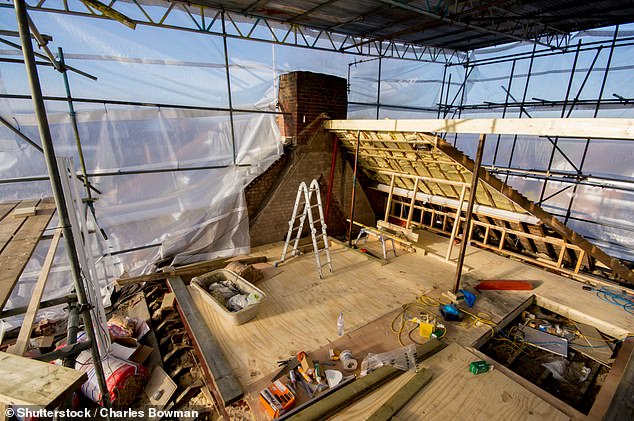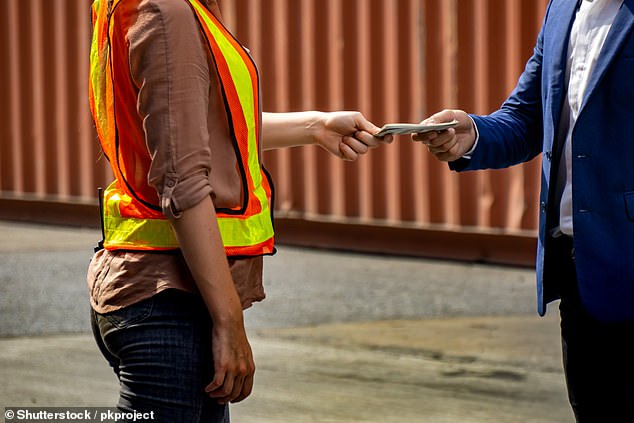I’ve recently had planning permission to build a loft conversion and roof terrace at my home.
The builders are about to start, but the man in charge – who heads the business – has asked if he could be paid half the funds in cash. He says his team prefers cash so he pays them that way.
However, I suspect their motivation might be something to do with tax – although this is just a theory and I have no proof.
Would I potentially be at risk of aiding and abetting tax evasion by paying them in cash or am I within my rights to pay them as they wish? After all, it is legal tender.
They have also asked for me to pay the cash in weekly installments over eight weeks to help their cashflow. Given the total cash sum will be £40,000, that will mean I have to withdraw £5,000 each week.
I’m assuming I can’t just go to the cash machine and do this and will need to visit a bank branch to do so.
But won’t the bank clerk ask questions about what the cash is needed for and if so what should I say? Surely honesty is the best policy and paying builders in cash is a perfectly normal practice.
Also my only experience of visiting a bank branch was akin to a hospital waiting room – it took over an hour to be seen and I felt rather sorry for all the staff. So out of interest, what are the least busy times of day to visit a bank branch?

Expensive: The builder has asked our reader to pay half the amount in cash, which will mean they have to withdraw £5,000 each week for eight weeks
Ed Magnus of This is Money replies: Unless the builder has told you they want cash to evade tax, there is nothing illegal about paying them in cash. It is their responsibility to declare this to the taxman, not yours.
The bigger headache for you is having to withdraw this cash on a weekly basis. Bank branches can have long and slow queues.
The best time to visit will depend on the local branch you intend to visit.
Luckily, Google often shows information such as popular times and typical waiting times for stores, including bank branches. It tends to appear below your regular business information on Google Maps and Search.
On your first trip to the bank, you could also ask the bank clerk about the quietest times to drop in for future visits.
You are correct that withdrawing £5,000 from an ATM will almost certainly not be possible to do in one day unless you have multiple current accounts with different banks.
Most banks have daily ATM limits. How much you can withdraw will depend on your bank and what type of account you hold.
For example, Barclays has a daily limit of £300 on its standard current accounts but customers are able to set any limit between £0 and £500.
Premier banking customers can withdraw £1,000 each day – but again have the power to set that limit to anything between £0 and £2,000.
If you opt to make regular cash withdrawals from an ATM then be aware that your bank may contact you to verify the transactions are yours.
But just remember banks will never ask you to move money from your account – if you receive a call asking you to do so, it will be a scam.
If you decide to withdraw cash by visiting your local bank branch, they may well ask about the purpose of your withdrawal given it may be seen as unusual and a necessary check to guard against fraud or money laundering.
Again, you are perfectly within your rights to say you are withdrawing cash to pay a builder for home renovations.
Some banks have been known to be quite difficult and may request proof of the building works in the form of an invoice. However, most should be more relaxed and not require any documentation.

Unless the builder has told you they want cash to evade tax, there is nothing illegal about paying them in cash
For expert advice we spoke to Angela Kerr, a director at property advice website HomeOwners Alliance and Chun Wong, head of dispute resolution at Hodge Jones & Allen.
Is it okay to pay builders in cash?
Chun Wong replies: Paying cash for goods and services is on the face of it not illegal.
It is only a criminal offence under the Criminal Finances Act 2017, if you knowingly aid or abet (i.e. facilitate) the tax evasion.
The builders have provided you with an explanation and you have no evidence to believe otherwise.
You may wish to check if they are VAT registered and if so they should provide you with a VAT invoice or receipt for the monies and work done.
You should also check that they have insurance in the event that there are any issues with the works and you need to bring a claim for poor workmanship and any consequential losses, given the value of the works being undertaken is substantial.
You should check whether on completion of the works there will be a guarantee or warranty issued.

Chun Wong, head of dispute resolution at Hodge Jones & Allen
Angela Kerr adds: You’re not the first person to toil over how to pay tradespeople.
When we commissioned a YouGov poll with the Federation of Master Builders to find out more about this it revealed a third – approximately 5.3million – homeowners confessed to paying cash to avoid VAT costs on home improvements and make their project more affordable.
What about withdrawing cash from a bank?
Chun Wong replies: The amount of cash that can be withdrawn in one go will depend on the bank’s own terms and conditions.
If an explanation is requested (usually for fraud prevention) you should tell them the true reason – that you are paying for substantial works to your house
Should they pay the builders in a different way?
Angela Kerr replies: There is no standard approach to how, when and what builders can charge and what’s the best payment schedule to protect theirs and your interests, so everyone muddles through.
But 50 per cent sounds a lot upfront but firms do ask it for bigger projects.

Angela Kerr, director at HomeOwners Alliance
But doing a significant home improvement project like yours and paying cash with no audit trail in the form of an invoice, receipt or bank transfer trail is a big risk.
You’ll end up with no proof that they have done the work – and therefore no guarantee that if things go wrong they will come back to put things right.
And having an agreement in writing and a receipt or payment trail is essential if you ever need to take a builder to the small claims court.
So I’d recommend sitting down and pulling together a contract.
Rics provide domestic project friendly building contracts. Or at the very least get payment terms agreed in writing.
Rather than big lumps of cash in arbitrary weekly payments, could you negotiate a smaller percentage up-front and then push for payments according to milestones or stages of the project.
For example, at completion of the opening up works, completion of steel installation etc.
Save a good percentage for final payment on completion and once any final snagging is done. That would be more meaningful and ensure they have an incentive to get on with the work.












